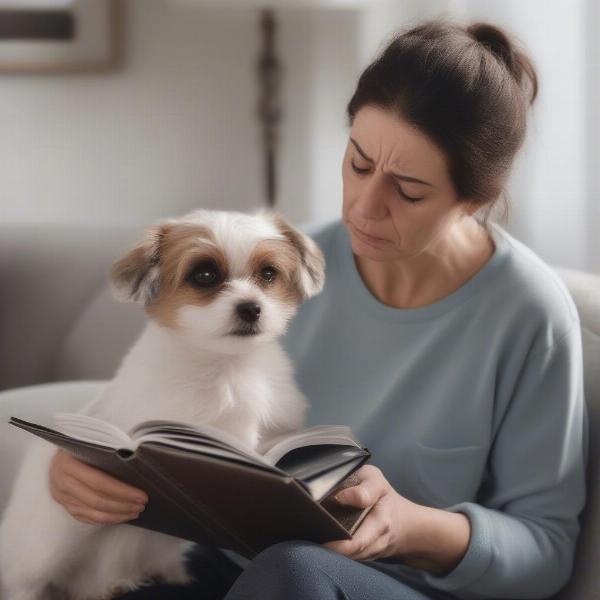The devastating scenario of a larger dog harming or killing a smaller dog within the same household is a heartbreaking reality for some owners. This experience, encapsulated by the search term “my big dog killed my little dog,” speaks to a profound sense of loss, guilt, and confusion. This article aims to provide support and guidance for those grappling with this tragedy, addressing the emotional aftermath, practical next steps, and preventing future incidents.
Understanding the Dynamics of Inter-Dog Aggression
While the phrase “my big dog killed my little dog” suggests a deliberate act, it’s crucial to understand that canine aggression rarely stems from malice. Size disparity can make seemingly playful interactions turn fatal. A larger dog’s prey drive, even if unintentionally triggered, can lead to devastating consequences for a smaller, more vulnerable dog. Factors such as resource guarding (food, toys, attention), territorial behavior, or even a playful nip gone wrong can escalate quickly.
Recognizing the Triggers
Identifying the specific triggers that led to the incident is vital for preventing future tragedies. Was there a history of tension between the dogs? Did the incident occur during feeding time or while playing with a favorite toy? Understanding these triggers can inform future dog ownership decisions and guide behavioral modification strategies.
Coping with the Emotional Aftermath
The emotional toll of losing a beloved pet in such a traumatic way is immense. Grief, guilt, and even anger are common responses. It’s essential to allow yourself time to mourn the loss of your smaller dog without self-blame.  Grieving pet owner Seeking support from friends, family, or a therapist specializing in pet loss can provide comfort and guidance during this difficult time.
Grieving pet owner Seeking support from friends, family, or a therapist specializing in pet loss can provide comfort and guidance during this difficult time.
What to Do with the Larger Dog
The question of what to do with the larger dog after such an incident is complex and deeply personal. There is no one-size-fits-all answer. Factors such as the dog’s history, the severity of the aggression, and the owner’s ability to manage the dog’s behavior must be carefully considered. Rehoming, with the help of a reputable rescue organization experienced in handling dogs with a history of aggression, might be necessary. In some cases, euthanasia might be the most humane option, especially if the dog poses a significant risk to other animals or humans. Consulting with a certified veterinary behaviorist is crucial for making informed decisions.
Preventing Future Tragedies: Multi-Dog Households
For those considering or currently managing multi-dog households, proactive measures are crucial for preventing similar tragedies.
Careful Introductions
Introducing dogs gradually and under controlled supervision is essential. Initial interactions should be brief and positive, with plenty of space for each dog to retreat.
Resource Management
Separate feeding areas, toys, and resting places can minimize resource guarding. Supervising playtime and intervening at the first sign of tension can prevent escalation.
Training and Socialization
Consistent training and socialization from an early age can help dogs develop appropriate social skills and learn to interact safely with other animals.
Conclusion
The experience of having “my big dog killed my little dog” is a traumatic one. Understanding the dynamics of inter-dog aggression, coping with the emotional aftermath, and implementing preventative strategies can help navigate this difficult situation and promote safer cohabitation for dogs in the future. Remember to seek professional help and support during this challenging time.
FAQ
- What should I do immediately after my big dog attacks my little dog? Separate the dogs immediately and seek veterinary care for the injured dog. If the smaller dog has passed, handle the body with respect and consider contacting your vet or local animal services for guidance.
- Is my big dog inherently aggressive? Not necessarily. Aggression can be triggered by various factors, and professional assessment is needed to determine the underlying cause.
- Can I ever trust my big dog around other small animals? This depends on the individual dog, the severity of the incident, and the effectiveness of behavioral modification. Professional guidance is essential.
- How can I prevent inter-dog aggression in my household? Careful introductions, resource management, training, and socialization are key preventative measures.
- Where can I find support after losing my dog? Pet loss support groups, therapists specializing in pet bereavement, and online forums can offer comfort and guidance.
- What should I consider when rehoming a dog with a history of aggression? Work with a reputable rescue organization experienced in handling dogs with behavioral issues and be completely transparent about the dog’s history.
- Is euthanasia ever the right choice? In some cases, euthanasia might be the most humane option for a dog with severe aggression, especially if it poses a significant risk to others.
Related Articles:
About ILM Dog: ILM Dog is your trusted international resource for all things dog-related. We offer expert advice on dog breeds, health, training, nutrition, grooming, and much more. Whether you’re a new dog owner or a seasoned expert, ILM Dog provides practical tips and valuable insights to help you give your furry friend the best possible care. From selecting the right breed to understanding canine behavior, we’re here to support you every step of the way. For expert advice and personalized support, contact us via email at [email protected] or call us at +44 20-3965-8624.